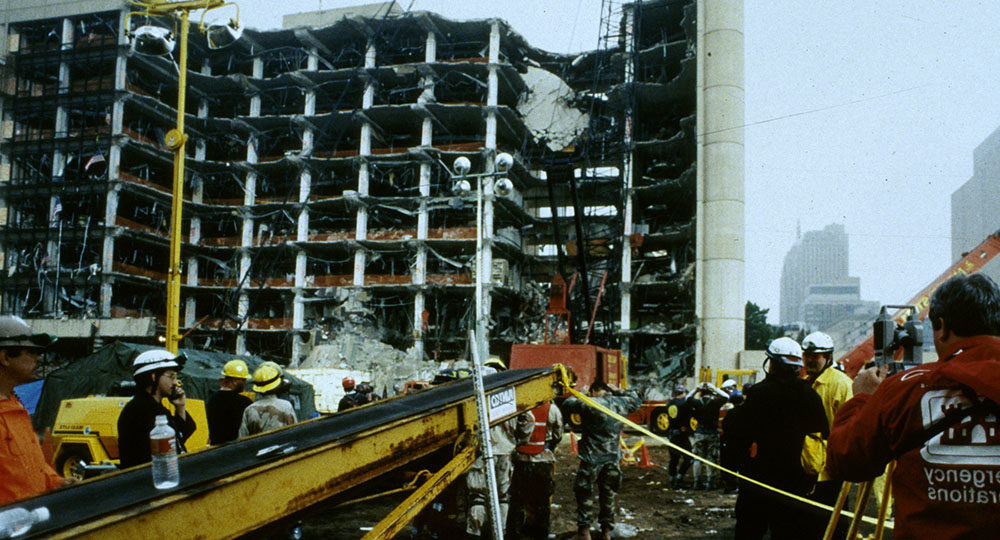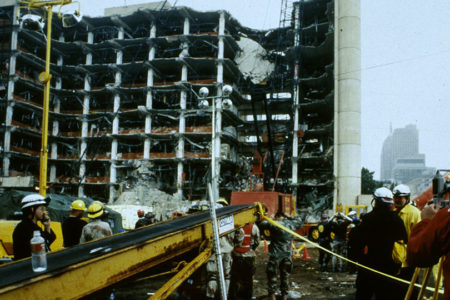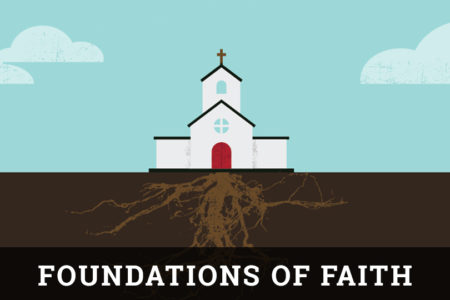The Last Word
“I am Alpha and Omega, the beginning and the end, the first and the last” (Rev. 22:13).
America has once again witnessed the stomach-wrenching emotion of flag-draped coffins being carried from large Air Force cargo planes. Grieving widows and their children are told by grim-faced leaders that their loved ones did not die in vain. The nation can be sure that the perpetrators will be punished and that this sacrifice of lives somehow advanced the cause of world peace.
We would hope so, but most people are not sure anymore. The reality is that there will be more body bags, weeping, and words that somehow have a definitively hollow ring to them. Their assurances fall on increasingly cynical ears because the killers of our nation’s best are not uniformed, regular army personnel. They come, rather, from the scruffy ranks of fanatical cells with diverse agendas and strange names. As often as not, our intelligence people have to guess, from a number of claimants, who the most likely suspects are.
There are times when we do know the motives of the attackers. This was true in the recent bombing of the military apartment complex in Dhahran, Saudi Arabia. The Saudis—whom we are ostensibly there to protect, while keeping an eye on Saddam Hussein—had refused to grant permission for more perimeter protection around the housing complex where American pilots and their families lived. We all witnessed the result in a spectacle depressingly reminiscent of the federal building in Oklahoma City last year.
Chasing the Great Satan
Groups with names like “Hizbullah-Gulf” and “Legion of the Martyr” have declared that they will continue slaughtering Americans until they stop “occupying the holy Saudi land.” Word issued from Iran said flatly that Saudi Arabia will witness an Islamic revolution unless United States forces withdraw from the kingdom and the government stops giving political voice to the opposition. Although we do not know the exact location of or numbers in the groups claiming responsibility, we do know the identity of the rogue nations who sent them to kill 19 and wound some 400 of our people. Yet effective efforts to go after the countries who load the guns for fanatical triggermen are stymied by forces among the Western nations who fancy monetary gain through trade with these terrorist nations to be more important than the lives of young Americans.
When asked what must be done to stop the attacks on our military personnel and their families, the answer is most frequently given with a shrug of the shoulders and an admission that, in the final analysis, nothing can be done to completely stop terrorist attacks. Standing before the bombed-out apartment complex in Saudi Arabia, a young female soldier said, “You can’t stop it. If they want to get you, they can get you.” That knowledge is a pretty heavy burden for our young people to carry every time they step out of their barracks—or go to bed in them, for that matter.
A political scientist from Kuwait defined the objectives of the Islamic terrorists in Saudi Arabia and the region. “Their aim,” he said, “is to establish an Islamic republic in Saudi Arabia, [and] to expel the Western influence and presence from the area.” By attacking military personnel, the terrorists also aim to undermine the ruling House of Saud’s claim to protect the faith and the two holiest mosques in the Moslem world at Mecca and Medina.
A Lesson for the Golan Heights
Before the defeat of former Israeli Prime Minister Shimon Peres, word was out that a deal had been cut to return the Golan to Syria. The agreement allegedly contained a pledge from the United States that U.S. troops would be placed between Syrian and Israeli forces to help enforce the peace.
Protests came from many quarters in Israel expressing concern that:
- American troops would inevitably be vulnerable to terrorist attacks.
- American deaths in the interest of peace between Israel and Syria could jeopardize relations between the United States and Israel.
- It was unwise to ask America to commit ground troops to protect Israel. The Israel Defense Force was perfectly capable of providing its own protection.
Since the election of Benjamin Netanyahu with his promise that the Golan Heights will not be returned to Syria, everyone involved can breathe a bit easier—at least for the time being. We have not yet seen how much pressure the new government will experience from the United States and other “allies” to give Syria what Assad wants, in the hope that he will show some flexibility on other fronts.
The point remains that terrorism—whether sponsored by religious fanatics in the Middle East or self-styled, disenfranchised American revolutionaries—is a force that, humanly speaking, is virtually unstoppable. For this reason, life on this planet is taking an unprecedented turn toward indiscriminate violence in a war calculated to murder and maim innocent people.
Seeking Another Way
During the recent Israeli election, some spoke of the necessity of a new force in Israeli politics—one that promoters felt would more effectively confront the deadly issues facing the nation. Indeed, the Third Way party was formed and enjoyed some success by winning four seats in the Knesset. In the former Soviet Union, the new flirtation with a return to Communism demonstrates the volatility of international electorates searching for something better than conventional politicians have to offer. In the last two U.S. elections, some have advocated a third party. Beyond this, there are, by their own admission, splinter groups rising in troublingly significant numbers and declaring themselves to be revolutionaries. The bombing of the federal building in Oklahoma City is a chilling reminder of their malicious intent to bring their brand of change to America.
The question is whether, given the nature of the conflict, any system will be able to successfully confront these issues, which are fueled by fanaticism and funded by nations bent on world domination. It would appear that we are on a collision course with a world system that is rapidly running out of answers.
The search for another way raises the specter, in the minds of Bible-believing Christians, of the satanic solution to mankind’s insoluble dilemma that demands the entry of someone with superhuman qualities—someone who can bring order out of chaos. He is, it goes without saying, the infamous Antichrist.
But, as we move toward the dawn of a new millennium, let us not fill our minds with the negative aspects related to a world system that is degenerating into precisely what the prophetic Scriptures have described as symptomatic in the last days. No, we have better thoughts with which to fill our minds.
The Last Word
Revelation 22 gives us a comprehensive chronicle of God’s last word for the last days. The most comforting rises from the words inscribed at the head of this article:
“I am Alpha and Omega, the beginning and the end, the first and the last.”
This is not the empty rhetoric of some glib politician tickling the ears of a generation too biblically and historically illiterate to sort pompous overstatement from divine authority. Jesus said it for all of us to hear. The beginning, the ending, and all that lies between are restricted to His permissive will and under His ultimate dominion. No less than three times He sends out the word that should guide us through the dark days around and ahead of us.
“Behold, I come quickly. Blessed is he that keepeth the words of the prophecy of this book” (v. 7).
“And, behold, I come quickly, and my reward is with me, to give every man according as his work shall be” (v. 12).
“He who testifieth these things saith, Surely, I come quickly. Amen. Even so, come, Lord Jesus” (v. 20).
“I come quickly!” That is the word for our hearts.
During a recent interview for the final segment of The Promise video series, I asked Meno, our field leader in Israel, to give his heart feeling about the timing of the coming of the Messiah. His face lit up as he quickly responded, “Now! I believe He can come at any moment. Yes, perhaps now.”
What impressed me was the sense that this young man intensely believed what he was saying. Some of us, I’m afraid, believe intellectually that Jesus may come for His church today, but we don’t live as though we really think it may actually happen today. In Jerusalem that night, I was refreshed to be in the presence of one who believes it and is ministering as though he is convinced it could be today. There is, of course, a multitude more among those “that love his appearing” (2 Tim. 4:8). But there are also multitudes of professing Christians who are going through the motions, and we are led at times to wonder what they believe at all.
My wife and I often drive between The Friends of Israel headquarters in New Jersey, and our residence in Virginia. On a recent weekend trip, I saw a bumper sticker on a car traveling north on I-95. I’ve seen a lot of bumper stickers in my time, most of them many times over. I’d never seen this one before. It read, “JESUS IS COMING—LOOK BUSY.” I’m sure it was meant to be sarcastic, but it made a crucial point. Too many of us are in the “look busy” mode without giving much thought to what it is we should be busy about.
The first order of business outlined in the “I come quickly” succession is the matter of standing for the truth. The particular aspect of truth referred to here is prophetic truth related to the last days.
For those who do so, there is a reward to be reaped. “My reward,” He says, “is with me, to give every man according as his works shall be” (v. 12).
After mentioning the “unjust” (v. 11) and issuing a stern warning to those who “take away from the words of the book of this prophecy” (v. 19), He closes with a final “I come quickly”—the definitive last word of the Bible. And what response does He receive? It is a hearty “Amen. Even so, come, Lord Jesus.”
Thus we have the last word of the Messiah and the last word of expectant believers. Herein we find all of the encouragement we need as we stand on historical shifting sands at the close of this millennium. We have a faithful Lord who always performs what He promises. In essence, He is saying to us, “Keep looking up.” He is also reminding us that there is a faithful remnant saying, “Yea and Amen,” and moving against the tide toward the sure reward awaiting those who love His appearing.








